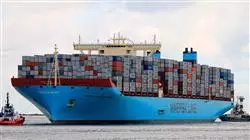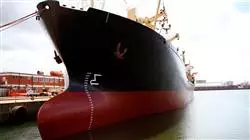University certificate
Scientific endorser

The world's largest faculty of engineering”
Introduction to the Program
Learn to design, evaluate and manage Naval and Ocean Engineering projects using the most up-to-date and innovative techniques in the sector”

The Masters Degree in Naval and Ocean Engineering includes all the stages in the life of a naval project, including the main areas of work, from feasibility studies, conceptual, basic and detailed engineering or production, to shipyard deliveries and ship operations from the point of view of shipowners, as well as all the new trends in technologies and processes in the naval market.
The program will review the available software that increases computing power in naval engineering and it will address the stages in production, as well, including the most current approaches using the latest organizational measures in production and excellence, so students have a vision of a complete approach from the points of view of engineering, production and operations.
It must be noted that naval engineering is undergoing digital transformation, which is why this Naval and Ocean Engineering will cover the digital transformation of business structures using new tools and new technologies.
The naval engineering sector is a global market, so all companies must be structured and oriented nationally and internationally if they want to be competitive. Following this criterion, this educational program will focus on the concept of globalization and will explore the opportunities offered by the global market using information on existing grants, programs and European commissions.
Furthermore, new visions are brought to the field of naval engineering, updating knowledge with new emerging innovative technologies and industry 4.0 for all the agents involved in the life of a project, putting the focus on business from the point of view of shipowners, shipyards and engineering.
As it is a 100% online Masters Degree, students will not be constrained by fixed schedules or the need to commute to another physical location, rather, they can access the contents at any time of the day, balancing their work or personal life with their studies.
The completion of thisMasters Degree will place Naval and Ocean Engineering professionals at the forefront of the latest developments in the sector”
This Masters Degree in Naval and Ocean Engineering contains the most complete and up-to-date academic program on the market. The most important features include:
- Practical cases presented by experts in Naval and Ocean Engineering
- The graphic, schematic, and eminently practical contents with which they are created, provide scientific and practical information on the disciplines that are essential for professional practice
- Practical exercises where self-assessment can be used to improve learning
- Special emphasis on innovative methodologies in Naval and Ocean Engineering
- Theoretical lessons, questions to the expert, debate forums on controversial topics, and individual reflection assignments
- Content that is accessible from any fixed or portable device with an Internet connection
This Masters Degree is the best investment you can make in selecting a refresher program in the field of Naval and Ocean Engineering . We offer you quality and free access to content"
The teaching staff includes professionals from the naval engineering sector, who bring their experience to this update program, as well as renowned specialists from leading societies and prestigious universities.
The multimedia content, developed with the latest educational technology, will provide the professional with situated and contextual learning, i.e., a simulated environment that will provide immersive training programmed to train in real situations.
The design of this program focuses on Problem-Based Learning, which means the student must try to solve the different real-life situations of that arise throughout the academic program. For this purpose, the professional will be assisted by an innovative, interactive video system created by renowned and extensively experienced experts in Naval and Ocean Engineering.
This program comes with the best educational material, providing you with a contextual approach that will facilitate your learning"

This 100% online Masters Degree will allow you to balance your studies with your professional work. You choose where and when to train"
Why study at TECH?
TECH is the world’s largest online university. With an impressive catalog of more than 14,000 university programs available in 11 languages, it is positioned as a leader in employability, with a 99% job placement rate. In addition, it relies on an enormous faculty of more than 6,000 professors of the highest international renown.

Study at the world's largest online university and guarantee your professional success. The future starts at TECH”
The world’s best online university according to FORBES
The prestigious Forbes magazine, specialized in business and finance, has highlighted TECH as “the world's best online university” This is what they have recently stated in an article in their digital edition in which they echo the success story of this institution, “thanks to the academic offer it provides, the selection of its teaching staff, and an innovative learning method aimed at educating the professionals of the future”
A revolutionary study method, a cutting-edge faculty and a practical focus: the key to TECH's success.
The most complete study plans on the university scene
TECH offers the most complete study plans on the university scene, with syllabuses that cover fundamental concepts and, at the same time, the main scientific advances in their specific scientific areas. In addition, these programs are continuously being updated to guarantee students the academic vanguard and the most in-demand professional skills. In this way, the university's qualifications provide its graduates with a significant advantage to propel their careers to success.
TECH offers the most comprehensive and intensive study plans on the current university scene.
A world-class teaching staff
TECH's teaching staff is made up of more than 6,000 professors with the highest international recognition. Professors, researchers and top executives of multinational companies, including Isaiah Covington, performance coach of the Boston Celtics; Magda Romanska, principal investigator at Harvard MetaLAB; Ignacio Wistumba, chairman of the department of translational molecular pathology at MD Anderson Cancer Center; and D.W. Pine, creative director of TIME magazine, among others.
Internationally renowned experts, specialized in different branches of Health, Technology, Communication and Business, form part of the TECH faculty.
A unique learning method
TECH is the first university to use Relearning in all its programs. It is the best online learning methodology, accredited with international teaching quality certifications, provided by prestigious educational agencies. In addition, this disruptive educational model is complemented with the “Case Method”, thereby setting up a unique online teaching strategy. Innovative teaching resources are also implemented, including detailed videos, infographics and interactive summaries.
TECH combines Relearning and the Case Method in all its university programs to guarantee excellent theoretical and practical learning, studying whenever and wherever you want.
The world's largest online university
TECH is the world’s largest online university. We are the largest educational institution, with the best and widest online educational catalog, one hundred percent online and covering the vast majority of areas of knowledge. We offer a large selection of our own degrees and accredited online undergraduate and postgraduate degrees. In total, more than 14,000 university degrees, in eleven different languages, make us the largest educational largest in the world.
TECH has the world's most extensive catalog of academic and official programs, available in more than 11 languages.
Google Premier Partner
The American technology giant has awarded TECH the Google Google Premier Partner badge. This award, which is only available to 3% of the world's companies, highlights the efficient, flexible and tailored experience that this university provides to students. The recognition as a Google Premier Partner not only accredits the maximum rigor, performance and investment in TECH's digital infrastructures, but also places this university as one of the world's leading technology companies.
Google has positioned TECH in the top 3% of the world's most important technology companies by awarding it its Google Premier Partner badge.
The official online university of the NBA
TECH is the official online university of the NBA. Thanks to our agreement with the biggest league in basketball, we offer our students exclusive university programs, as well as a wide variety of educational resources focused on the business of the league and other areas of the sports industry. Each program is made up of a uniquely designed syllabus and features exceptional guest hosts: professionals with a distinguished sports background who will offer their expertise on the most relevant topics.
TECH has been selected by the NBA, the world's top basketball league, as its official online university.
The top-rated university by its students
Students have positioned TECH as the world's top-rated university on the main review websites, with a highest rating of 4.9 out of 5, obtained from more than 1,000 reviews. These results consolidate TECH as the benchmark university institution at an international level, reflecting the excellence and positive impact of its educational model.” reflecting the excellence and positive impact of its educational model.”
TECH is the world’s top-rated university by its students.
Leaders in employability
TECH has managed to become the leading university in employability. 99% of its students obtain jobs in the academic field they have studied, within one year of completing any of the university's programs. A similar number achieve immediate career enhancement. All this thanks to a study methodology that bases its effectiveness on the acquisition of practical skills, which are absolutely necessary for professional development.
99% of TECH graduates find a job within a year of completing their studies.
Master's Degree in Naval and Ocean Engineering
The design, planning and construction of floating artifacts, such as ships, platforms and boats, are activities intimately linked to the maritime development of countries, and, therefore, are also linked to industrial and economic development. Hence, this branch of engineering is subject to constant technological updates. In order to renew the knowledge of the field, TECH Global University created this Master's Degree, whose curriculum covers each stage of the life cycle of a naval project. Thanks to the contents, designed by our teaching team, it will be possible to deepen in the different types of engineering that make up the naval specialty, as well as in the management and operation of shipyards and artifacts. In addition, the analysis of feasibility and negotiation, key elements for the insertion of projects in today's market, will be addressed. At the end of the program, the engineer will be able to establish new approaches to the industry, through the use and application of emerging technologies and methodologies.
Postgraduate Degree in Naval and Oceanic Engineering
In order to be able to respond to the practical needs and solve the challenges that become evident during the construction of naval structures, it is essential to have a set of specialized knowledge and skills in this field. To accompany you in your updating process, TECH offers this Master's Degree focused on the management of structural projects of ships and vessels, at national and international level. In order to facilitate the acquisition of skills, a syllabus has been designed with special emphasis on the digitization of the tasks of naval practice. From the conceptual review and the use of software, aimed at simplifying and perfecting the calculations, the professional will be able to sharpen his skills in the measurement of production and exploitation. In this way, the future naval engineer will be able to take advantage of all the opportunities offered by the global market, since he/she will meet the work criteria required by European subsidy programs and commissions. Likewise, he/she will be able to perform or intervene in fields such as port administration and energy exploitation.







